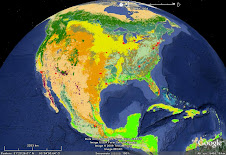Hoy se desarrolló otro side-event con participantes del World Bank, Global Witness, FAO, WRI e INECZ y los puntos principales fueron:
• REDD es mucho más que carbono secuestrado, tiene implicaciones sociales y de biodiversidad que deben ser atendidas
• Los sistemas de gobierno y administración son muy importantes y pueden guardar la clave para la correcta implementación del mecanismo
• Es necesario tener un diagnóstico claro sobre las tasas de deforestación y los impulsores de la misma, dentro de estrategias nacionales de REDD que consideren un sistema MRV (Medibles, Reportables y Verificables)
• La revisión por los colegas (peer reviewed) es fundamental
• El alcance de REDD fue reducido ayer en el texto que se discute y esto no es buena señal
• No tenemos que decidir todo de una vez, hay que darle tiempo al proceso
• Los países más beneficiados por REDD son los que menos información de inventarios tienen
• Es necesario hacer inversiones institucionales de largo plazo para poder tener consistencia en los inventarios forestales y mucha creación de capacidades locales
• Existe una corrupción muy grande en el manejo de los bosques en los países en desarrollo
• Existen disponibles métodos costo-eficientes y expertise para desarrollar este mecanismo
• Para que REDD funcione se necesita gente comprometida, concurrencia de múltiples actores y una sociedad empoderada
• La demanda para los mercados voluntarios es menor que los obligatorios en un entorno macroeconómico como el presente.
Today there was a side-event with participants from World Bank, Global Witness, FAO, WRI y INECZ and the main points were:
• REDD is much more than carbon sequestration, it has social and biodiversity implications that must be dealt with.
• Governance systems are very important and can be the key to correct implementation of the mechanism.
• It is necessary to have a clear diagnose on deforestation rates and the drivers of it, within national REDD strategies that consider a MRV system.
• Peer review is fundamental for this.
• REDD scope was reduced yesterday on the text that is being discussed and this is no good sign.
• We don’t have to decide everything today, we must give the process some time.
• Countries that are most beneficial in REDD are the ones with the least information on inventories and readiness.
• It is needed to make institutional long term investments to have consistency on inventories, and a lot of work on capacity building.
• Big corruption on forest management on developing countries.
• Cost effective methods and expertise are available to develop REDD.
• For REDD to work we need people that are committed and the concurrence of multi-stakeholders and empowered society.
• The demand for voluntary markets is less than the compliance ones especially on a macroeconomic ambient like we have today.
skip to main |
skip to sidebar

Co2 Sensitivity Map

Este Blog está dedicado a compartir información y opiniones sobre secuestro de carbono forestal y en biomasa utilizando, entre otros, el Marco Integral. This Blog is dedicated to sharing information and opinions about carbon sequestration on forests and biomass using, among others the Integral Framework.
Escribeme a / Write me to
pabloquiroga@hotmail.com
¿QUE ESTAS BUSCANDO / WHAT ARE YOU LOOKING FOR?
- INFO SOBRE CAMBIO CLIMATICO Y DESARROLLO SUSTENTABLE
- INFO SOBRE SECUESTRO DE CARBONO FORESTAL
- INFO SOBRE TENDENCIAS MUNDIALES
- INFO SOBRE MERCADOS DE CARBONO
- REPORTES DE CONGRESOS Y CONFERENCIAS
- INFO ABOUT CLIMATE CHANGE & SUSTAINABLE DEVELOPMENT
- INFO ABOUT CARBON SEQUESTRATION ON FORESTS
- INFO ABOUT WORLD TENDENCIES
- INFO ABOUT CARBON MARKETS
- REPORTS OF CONFERENCES AND EVENTS
- INFO SOBRE SECUESTRO DE CARBONO FORESTAL
- INFO SOBRE TENDENCIAS MUNDIALES
- INFO SOBRE MERCADOS DE CARBONO
- REPORTES DE CONGRESOS Y CONFERENCIAS
- INFO ABOUT CLIMATE CHANGE & SUSTAINABLE DEVELOPMENT
- INFO ABOUT CARBON SEQUESTRATION ON FORESTS
- INFO ABOUT WORLD TENDENCIES
- INFO ABOUT CARBON MARKETS
- REPORTS OF CONFERENCES AND EVENTS
Etiquetas
Cambios Climate Change
(8)
Congresos and Conferences
(14)
COP15
(14)
Foresteria / Forestry
(5)
INFO BASE
(2)
modelo INTEGRAL model
(3)
Opinion Integral
(5)
Secuestro Co2 Sequestration
(5)
Tendencias / Tendencies
(15)
INTERESTING LINKS / LIGAS
REPORTES DE LA COP15 EN COPENHAGUE
Consulta las actualizaciones e informes que hicimos desde la COP 15 en Copenhague 7 -18 Dic, siguiendo las tendencias de las negociaciones y poniendo enfasis en las implicaciones para los bosques. Buscalo en Etiquetas como :COP15
Consult the actualizations and news that we have done from COP 15 in Copenhaguen 7-18 Dec, following the tendencies on the negatiations and putting special interest on the implications for Forestry. Look for them in Tags as: COP15
Consult the actualizations and news that we have done from COP 15 in Copenhaguen 7-18 Dec, following the tendencies on the negatiations and putting special interest on the implications for Forestry. Look for them in Tags as: COP15

Co2 Sensitivity Map
¿Quien soy? Who am I

- Pablo Quiroga
- Distito Federal, Mexico
- Arquitecto Mexicano dedicado al Desarrollo Sustentable y a la Ecología Profunda. Fundador de Conciencia Planetaria A.C. dedicada al Desarrollo Sustentable y Fundador y Operador de Natura Proyectos Ambientales firma de consultoria sobre secuestro de carbono forestal. Mexican Architect Dedicated to Sustainable Development and Deep Ecology. Founder of Conciencia Planetaria NGO. dedicated to Sustainable Development. Founder and operator of Natura Proyectos Ambientales consulting firm dedicated to Carbon sequestration on forests.